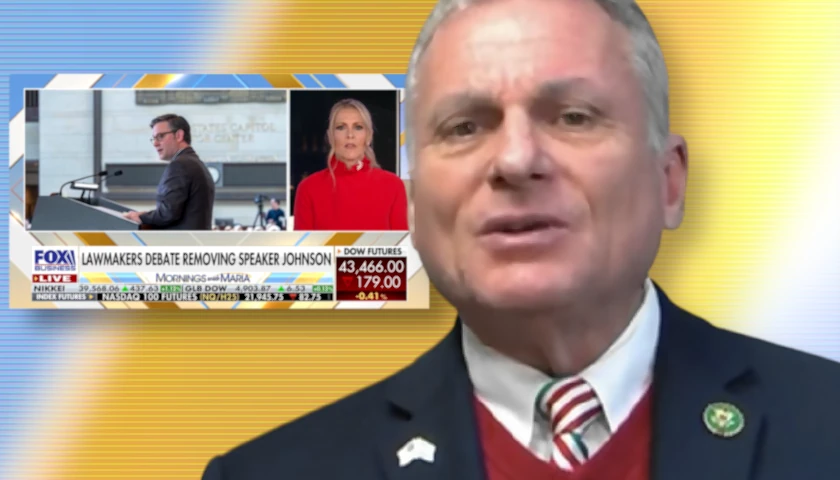by Paul Fitzpatrick
Trust in banks has plummeted. From 2019-2022, the percentage of people who believe banks and financial institutions have a positive effect on the country fell among Republicans (from 63 to 38 percent) and Independents (by nine points). The problem grows every time a right-of-center group is debanked. Recognizing the problem, “rebuilding trust” is the theme of the World Economic Forum in Davos, Switzerland. The path to rebuild trust in finance is simple—keep politics out of banking.
In spite of an alleged priority of building trust, the largest banks are aligning themselves with radical United Nations (UN) climate initiatives linked to radical efforts to reduce Africa’s population and destroy Sri Lankan agriculture.
In 2021, Bank of America, Citi, Goldman Sachs, JPMorgan Chase, Morgan Stanley, and Wells Fargo joined the UN-organized Net-Zero Banking Alliance (NZBA). NZBA banks promise that emissions from the banks’ “lending and investment portfolios” will “align with pathways to net-zero by mid-century, or sooner.” In other words, these banks have promised to reduce their customers’ emissions so that the world can meet net-zero greenhouse gas emissions. This requires banks to act as regulators, cutting customers off from capital when they don’t meet UN climate standards.
The banks’ NZBA commitments have teeth. A unit of the United Nations Environment Programme (UNEP) reviews the banks’ emissions reduction targets to ensure they line up with pathways to net zero. Banks are obediently following through. Each bank’s website contains emissions reduction targets for their customers within specific industries. America’s biggest banks must finish setting their targets for all industries this year.
UNEP’s “pathways to net-zero” involve radical changes to our world. Within agriculture, these pathways require sweeping changes such as cutting U.S. beef consumption in half and moving away from nitrogen fertilizer. According to UNEP, the biggest reduction in emissions comes from efforts to “reduce growth in demand for food.” To cut food demand amidst a growing global population, a UNEP-sponsored report proposes reducing Africa’s projected population by nearly half a billion people by 2050. The report proposes more access to “birth control” —which one of the report’s sources clearly defines as consisting of “contraception and induced abortion.” The report also cites a study co-written by a U.N. manager calling for governments to “establish a sensitization program intended to change the beliefs of religious leaders” in Africa on birth control, specifically singling out the Catholic Church.
UNEP’s efforts to promote pathways to net zero have already proven disastrous. In 2019, a high-ranking UNEP official publicly pushed Sri Lanka to “sound the alarm loud and clear” about nitrogen fertilizers and to “increase use of organic fertilizers.” The UNEP official promised her Sri Lankan listeners that global efforts to reduce nitrogen pollution would “lead to immediate benefits in the fight against climate change.” But when Sri Lanka subsequently banned any imported chemical fertilizers, its agriculture production dropped 50 percent, food inflation skyrocketed to 95 percent, and millions of Sri Lankans went hungry. According to the UN itself, the situation was Sri Lanka’s “worst economic crisis since independence, leaving nearly 5.7 million people in need of humanitarian assistance.”
Banks must choose between belonging to UN groups like NZBA, or rebuilding public trust. The NZBA’s organizers are clear that they have a political agenda to “accelerate decarbonization” and “transform the economy.” Any debanked institution will rightly wonder if the reason they lost services is because they didn’t align with UN pathways to net zero.
In 2023, Bank of America abruptly debanked a Tennessee-based ministry that provides for Ugandan orphans and has strong pro-life views. Was this because pro-life beliefs conflict with UN goals to reduce Africa’s population so the world can get to net zero? Does helping African orphans conflict with net zero efforts to reduce food demand in Africa? We’ll never know. The question is why an institution like Bank of America would voluntarily commit to such goals, and then subject itself to having every banking decision related to pro-life groups called into question.
The NZBA isn’t backing off. This year the NZBA is pushing banks to “rais[e] their ambitions and accelerate implementation … to reach net zero by 2050.” Banks should not be aligning their business with net zero pathways that require reducing the population of Africa, or restricting the use of fertilizers essential to human flourishing. Yet American banks have not only committed to net-zero pathways, they have given UNEP a supervisory role to make sure their commitments are fulfilled. If banks really care about “rebuilding trust,” they should leave the NZBA, disavow political goals, and return to non-partisan principles of treating all customers with fairness and respect.
– – –
Paul Fitzpatrick is president of the 1792 Exchange, an organization dedicated to advancing freedom by protecting small businesses and nonprofits and moving corporations back toward neutral.
Photo “Bank of America Lobby” by Bank of America.








